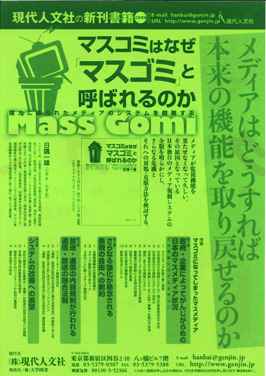日本が批准している「国際人権(自由権)規約」に基づいて、日本の人権状況について政府が提出した「第5回日本政府報告書」に対する「日本弁護士連合会報告書」のうち、メディア関係に関する部分を紹介します。
なお、「自由権規約」とは、1966年12月の国連総会で採択され、1976年に発効した「市民的及び政治的権利に関する国際規約」を指します。これは、1948年の世界人権宣言の内容を各国において拘束力のある法規範にするためにつくられたもので、日本は自由権規約を1979年6月に批准しています。その内容は日本国内でも憲法とともに高位の人権規範として法的効力をもつものです。
自由権規約委員会による第5回日本政府報告書審査は、10年ぶりに、2008年10月中旬(第94会期)にジュネーブで実施される予定となっています。審査は、政府報告書とNGO から提出された報告書などに基づき、日本の規約実施状況を審査するプロセスであり、締約国と規約委員会とが建設的対話を行い、これを通じて規約に定めた人権基準の実施を促進し、改善するために行われます。(日弁連ウェブサイトより)
日弁連報告書全文は:http://www.nichibenren.or.jp/ja/kokusai/humanrights_library/treaty/data/Alt_Rep_JPRep5_ICCPR_ja.pdf
◆ ◆ ◆
④ メディア関係
A 結論と提言
1 国は、日本では、放送行政を中央官庁たる総務省が司っていることから、放送メディアに対する与党を中心とする政治家の圧力を防ぐことができない。総務省は、放送局に対して、番組内容、編集、演出など番組作成に関して、行政指導すべきではない。
2 国は、放送行政を司る独立行政委員会を設置し、放送局に対する政治圧力を防ぐべきである。
3 国は、放送法改正案から、第53条8の2は削除されるべきである。
B 国際人権(自由権)規約委員会の懸念事項・勧告内容
記載なし。
C 政府の対応と第5回政府報告書の記述
記載なし。
D 日弁連の意見
1 NHK(日本放送協会)従軍慰安婦番組事件などにみる権力によるメディアへの支配介入
日本国憲法はその第21条において、「1項 集会、結社及び言論、出版その他一切の表現の自由は、これを保障する。2項 検閲は、これをしてはならない。通信の秘密は、これを侵してはならない。」と定められ、集会・結社・表現の自由、検閲の禁止、通信の秘密を保障している。
ところが、現実には、権力によるメディアへの支配・介入が隠然と行われている。
東京高等裁判所は、2007年1月29日、NHKが、政治家の圧力によって、番組を放送直前に改変したことを認定した。この番組は、第二次世界大戦におけるいわゆる従軍慰安婦に対する性暴力に関し、当時の政府の責任などを問おうとする民衆法廷を取り上げたものであった。東京高裁の判決によると、NHK幹部が放送日の数日前に政府高官(官房副長官)に面談した後、民衆法廷の判決言い渡し場面を削除したり、民衆法廷で証言した被害者(外国人女性)の証言シーンを削除するよう番組制作担当者に指示し、その意にそわない改変を行ったことが認められている。
この異常な事態に至った背景には、東京高裁判決も認定しているとおり、NHKが予算をスムーズに成立させるために予算の国会承認を前に国会議員の半数以上を個別に訪問し説明しているという実態がある。
本来、放送局は政治家から独立するべきである。
日本でも、第2次大戦後まもなく電波三法が制定され、中央官庁ではなく、政府・与党から距離を保てる独立行政委員会(電波管理委員会)が放送行政を司り、NHKの予算も独立行政委員会が国会に説明することで、政治介入を防いでいた。
ところが、日本が独立を回復してまもなく、政府与党は、上記独立行政委員会を廃止し、放送行政を自らの影響力下にある中央官庁である郵政省(当時)の所管とした。これは世界の主要国をみても異例なことである。
このため、NHKは、独立行政委員会という盾を失い、NHK幹部は政治家の圧力を直接受けることになり、ついにNHK従軍慰安婦番組事件における改変にみられるような個々の番組に対する介入までも許す結果となった。
さらには、総務省は、NHKに対して「北朝鮮の拉致報道を重点的にやりなさい」という個別的事項について放送法による「放送命令」まで出した。
このことは、NHKだけでなく、民放についても同様である。民放の場合、免許更新を政府与党の影響下にある中央官庁たる総務省に握られていることによって、番組内容、演出、編集に関してまで、行政指導がなされている。最近は、瑣末なミスをいちいち取り上げて厳重注意処分という行政処分を頻発しているが、報道の自由との関連から謙抑的でなければならない。こうして民放各社は行政、政治家からの独立が阻害されており、その結果、民放は押しなべて権力監視機能が弱体化している。
例えば、前記NHK従軍慰安婦番組事件の東京高裁判決についても、NHKが政治家の圧力によって番組を放送直前に改変したことを認定した事実が正確に報道されず、むしろ政治家の直接的な圧力が認定されなかったといわんばかりの報道までなされている。
放送行政の権限を政府・与党が直接握っている国は、主要国では日本とロシアくらいであり、日本でも、独立行政委員会を復活させることで、放送の独立性を確保する制度的保障が必要である。
2 放送法改正案
度重なるメディアの不祥事に対する批判的世論を背景にして、公権力はメディア規制を図ろうとし、総務省は、ある民放テレビ局の情報番組におけるデータ捏造問題をきっかけとして、ついに放送法改正案を国会に提出した。
放送法改正案は、2007年6月19日、衆議院で審議が開始された。
今回の法改正案第53条の8の2は、「1項 総務大臣は、放送事業者(受託放送事業者を除く。)が、虚偽の説明により事実でない事項を事実であると誤解させるような放送であって、国民経済又は国民生活に悪影響を及ぼし、又は及ぼすおそれがあるものを行い、又は委託して行わせたと認めるときは、当該放送事業者に対し、期間を定めて、同様の放送の再発の防止を図るための計画の策定及びその提出を求めることができる。2項 総務大臣は、前項の計画を受理したときは、これを検討して意見を付し、公表するものとする。」と規定している。
同条文は、「誤解させる」「悪影響」「及ぼすおそれ」等曖昧な文言を多用している。
これにより、個々の番組の評価を通じて総務大臣が放送内容へ介入する道を開くものであり、上記放送法改正案は、行政による放送の自由への侵害の危険が大きく、日本国憲法第21条にも反し、違憲の疑いが強い。
3 有事法制による放送局の指定公共機関化
有事法制3法には、放送局を指定公共機関とし、これらに対し、「必要な措置を実施する責務」を負わせ、内閣総理大臣が、対処措置を実施すべきことを指示し、実施されない時は自ら直接対処措置を実施することができるとされた。
これにより、政府が放送メディアを統制下に置き、市民の知る権利、メディアによる自由な批判や権力監視機能を目的とする、報道の自由を侵害し、国民主権と民主主義の基盤を崩壊させる危険がある。
4 放送行政の政府からの独立
1で述べたとおり、放送行政の権限を政府が一括して直接握っている国は、主要国では日本とロシアくらいである。アメリカには連邦通信委員会(FCC)、イギリスには独立テレビ委員会(ITC)、放送基準委員会(BSC)、フランスには、視聴覚最高評議会(CSA)、ドイツでは放送行政は各州に分属し、州メディア庁が行っている。イタリアには、1997 年に独立行政委員会(アウトリタ)が設立された(国の資金と放送局などの資金で構成)。
アジアでも、韓国では2000年新放送法が発効し、独立行政組織の韓国放送委員会ができた。台湾でも、2006年独立性の強い国家通信放送委員会ができた。
ちなみに、韓国では、反論権制度導入と共に、放送発展基金が資金を出す第三者的法定機関として言論仲裁委員会が設置されている(裁判官、弁護士、マスコミ出身者、知識人で構成)。
日本でも、1950年、電波管理委員会という独立行政委員会が総理府の外局に設置されたが、1952年に郵政省に権限が移行した。
あらためて、日本でも、電波管理委員会のような独立行政委員会が放送行政を管掌するべきである。
5 自主的な横断機関の設置(この部分は同時にアップした英語版は字数の問題で割愛しました。英語って文字数いきますね)
テレビ界においては、放送事業者が設置した機関で、青少年問題、放送による人権侵害、放送倫理問題を扱う、自主的な横断機関であるBPOがある。しかし、新聞及び雑誌メディアについては、このような業界横断的な機関の設置がなされていない。
国家権力から表現の自由を守るためにも、学者、マスコミ関係者、弁護士会推薦の弁護士その他の有識者によって構成される自主的な業界横断機関である報道評議会を設置すべきである。そして、この報道評議会には、マスメディアによる名誉毀損、プライバシー侵害について、調査、仲裁、裁定する機能を持たせるべきである。
報道被害救済の手段として、マスメディア自身によって設立される報道評議会による救済は、訴訟を始めとする法的手段による救済と比較して ① 簡易・迅速・廉価な救済を得られる可能性が大きいこと、 ② 法的手段による救済の外にあるとされる事案についても救済の可能性があること、 ③ マスメディア内部に自浄作用が発生し、報道被害を事前に防止する可能性が増大することが期待されることなどの利点が挙げられる。
現在、名誉毀損、プライバシー侵害を理由として権力によるマスメディア規制が進められているが、この機関を設置することにより権力による介入を防ぐことができる。
報道評議会の早急な設置が望まれる。
なお、「自由権規約」とは、1966年12月の国連総会で採択され、1976年に発効した「市民的及び政治的権利に関する国際規約」を指します。これは、1948年の世界人権宣言の内容を各国において拘束力のある法規範にするためにつくられたもので、日本は自由権規約を1979年6月に批准しています。その内容は日本国内でも憲法とともに高位の人権規範として法的効力をもつものです。
自由権規約委員会による第5回日本政府報告書審査は、10年ぶりに、2008年10月中旬(第94会期)にジュネーブで実施される予定となっています。審査は、政府報告書とNGO から提出された報告書などに基づき、日本の規約実施状況を審査するプロセスであり、締約国と規約委員会とが建設的対話を行い、これを通じて規約に定めた人権基準の実施を促進し、改善するために行われます。(日弁連ウェブサイトより)
日弁連報告書全文は:http://www.nichibenren.or.jp/ja/kokusai/humanrights_library/treaty/data/Alt_Rep_JPRep5_ICCPR_ja.pdf
◆ ◆ ◆
④ メディア関係
A 結論と提言
1 国は、日本では、放送行政を中央官庁たる総務省が司っていることから、放送メディアに対する与党を中心とする政治家の圧力を防ぐことができない。総務省は、放送局に対して、番組内容、編集、演出など番組作成に関して、行政指導すべきではない。
2 国は、放送行政を司る独立行政委員会を設置し、放送局に対する政治圧力を防ぐべきである。
3 国は、放送法改正案から、第53条8の2は削除されるべきである。
B 国際人権(自由権)規約委員会の懸念事項・勧告内容
記載なし。
C 政府の対応と第5回政府報告書の記述
記載なし。
D 日弁連の意見
1 NHK(日本放送協会)従軍慰安婦番組事件などにみる権力によるメディアへの支配介入
日本国憲法はその第21条において、「1項 集会、結社及び言論、出版その他一切の表現の自由は、これを保障する。2項 検閲は、これをしてはならない。通信の秘密は、これを侵してはならない。」と定められ、集会・結社・表現の自由、検閲の禁止、通信の秘密を保障している。
ところが、現実には、権力によるメディアへの支配・介入が隠然と行われている。
東京高等裁判所は、2007年1月29日、NHKが、政治家の圧力によって、番組を放送直前に改変したことを認定した。この番組は、第二次世界大戦におけるいわゆる従軍慰安婦に対する性暴力に関し、当時の政府の責任などを問おうとする民衆法廷を取り上げたものであった。東京高裁の判決によると、NHK幹部が放送日の数日前に政府高官(官房副長官)に面談した後、民衆法廷の判決言い渡し場面を削除したり、民衆法廷で証言した被害者(外国人女性)の証言シーンを削除するよう番組制作担当者に指示し、その意にそわない改変を行ったことが認められている。
この異常な事態に至った背景には、東京高裁判決も認定しているとおり、NHKが予算をスムーズに成立させるために予算の国会承認を前に国会議員の半数以上を個別に訪問し説明しているという実態がある。
本来、放送局は政治家から独立するべきである。
日本でも、第2次大戦後まもなく電波三法が制定され、中央官庁ではなく、政府・与党から距離を保てる独立行政委員会(電波管理委員会)が放送行政を司り、NHKの予算も独立行政委員会が国会に説明することで、政治介入を防いでいた。
ところが、日本が独立を回復してまもなく、政府与党は、上記独立行政委員会を廃止し、放送行政を自らの影響力下にある中央官庁である郵政省(当時)の所管とした。これは世界の主要国をみても異例なことである。
このため、NHKは、独立行政委員会という盾を失い、NHK幹部は政治家の圧力を直接受けることになり、ついにNHK従軍慰安婦番組事件における改変にみられるような個々の番組に対する介入までも許す結果となった。
さらには、総務省は、NHKに対して「北朝鮮の拉致報道を重点的にやりなさい」という個別的事項について放送法による「放送命令」まで出した。
このことは、NHKだけでなく、民放についても同様である。民放の場合、免許更新を政府与党の影響下にある中央官庁たる総務省に握られていることによって、番組内容、演出、編集に関してまで、行政指導がなされている。最近は、瑣末なミスをいちいち取り上げて厳重注意処分という行政処分を頻発しているが、報道の自由との関連から謙抑的でなければならない。こうして民放各社は行政、政治家からの独立が阻害されており、その結果、民放は押しなべて権力監視機能が弱体化している。
例えば、前記NHK従軍慰安婦番組事件の東京高裁判決についても、NHKが政治家の圧力によって番組を放送直前に改変したことを認定した事実が正確に報道されず、むしろ政治家の直接的な圧力が認定されなかったといわんばかりの報道までなされている。
放送行政の権限を政府・与党が直接握っている国は、主要国では日本とロシアくらいであり、日本でも、独立行政委員会を復活させることで、放送の独立性を確保する制度的保障が必要である。
2 放送法改正案
度重なるメディアの不祥事に対する批判的世論を背景にして、公権力はメディア規制を図ろうとし、総務省は、ある民放テレビ局の情報番組におけるデータ捏造問題をきっかけとして、ついに放送法改正案を国会に提出した。
放送法改正案は、2007年6月19日、衆議院で審議が開始された。
今回の法改正案第53条の8の2は、「1項 総務大臣は、放送事業者(受託放送事業者を除く。)が、虚偽の説明により事実でない事項を事実であると誤解させるような放送であって、国民経済又は国民生活に悪影響を及ぼし、又は及ぼすおそれがあるものを行い、又は委託して行わせたと認めるときは、当該放送事業者に対し、期間を定めて、同様の放送の再発の防止を図るための計画の策定及びその提出を求めることができる。2項 総務大臣は、前項の計画を受理したときは、これを検討して意見を付し、公表するものとする。」と規定している。
同条文は、「誤解させる」「悪影響」「及ぼすおそれ」等曖昧な文言を多用している。
これにより、個々の番組の評価を通じて総務大臣が放送内容へ介入する道を開くものであり、上記放送法改正案は、行政による放送の自由への侵害の危険が大きく、日本国憲法第21条にも反し、違憲の疑いが強い。
3 有事法制による放送局の指定公共機関化
有事法制3法には、放送局を指定公共機関とし、これらに対し、「必要な措置を実施する責務」を負わせ、内閣総理大臣が、対処措置を実施すべきことを指示し、実施されない時は自ら直接対処措置を実施することができるとされた。
これにより、政府が放送メディアを統制下に置き、市民の知る権利、メディアによる自由な批判や権力監視機能を目的とする、報道の自由を侵害し、国民主権と民主主義の基盤を崩壊させる危険がある。
4 放送行政の政府からの独立
1で述べたとおり、放送行政の権限を政府が一括して直接握っている国は、主要国では日本とロシアくらいである。アメリカには連邦通信委員会(FCC)、イギリスには独立テレビ委員会(ITC)、放送基準委員会(BSC)、フランスには、視聴覚最高評議会(CSA)、ドイツでは放送行政は各州に分属し、州メディア庁が行っている。イタリアには、1997 年に独立行政委員会(アウトリタ)が設立された(国の資金と放送局などの資金で構成)。
アジアでも、韓国では2000年新放送法が発効し、独立行政組織の韓国放送委員会ができた。台湾でも、2006年独立性の強い国家通信放送委員会ができた。
ちなみに、韓国では、反論権制度導入と共に、放送発展基金が資金を出す第三者的法定機関として言論仲裁委員会が設置されている(裁判官、弁護士、マスコミ出身者、知識人で構成)。
日本でも、1950年、電波管理委員会という独立行政委員会が総理府の外局に設置されたが、1952年に郵政省に権限が移行した。
あらためて、日本でも、電波管理委員会のような独立行政委員会が放送行政を管掌するべきである。
5 自主的な横断機関の設置(この部分は同時にアップした英語版は字数の問題で割愛しました。英語って文字数いきますね)
テレビ界においては、放送事業者が設置した機関で、青少年問題、放送による人権侵害、放送倫理問題を扱う、自主的な横断機関であるBPOがある。しかし、新聞及び雑誌メディアについては、このような業界横断的な機関の設置がなされていない。
国家権力から表現の自由を守るためにも、学者、マスコミ関係者、弁護士会推薦の弁護士その他の有識者によって構成される自主的な業界横断機関である報道評議会を設置すべきである。そして、この報道評議会には、マスメディアによる名誉毀損、プライバシー侵害について、調査、仲裁、裁定する機能を持たせるべきである。
報道被害救済の手段として、マスメディア自身によって設立される報道評議会による救済は、訴訟を始めとする法的手段による救済と比較して ① 簡易・迅速・廉価な救済を得られる可能性が大きいこと、 ② 法的手段による救済の外にあるとされる事案についても救済の可能性があること、 ③ マスメディア内部に自浄作用が発生し、報道被害を事前に防止する可能性が増大することが期待されることなどの利点が挙げられる。
現在、名誉毀損、プライバシー侵害を理由として権力によるマスメディア規制が進められているが、この機関を設置することにより権力による介入を防ぐことができる。
報道評議会の早急な設置が望まれる。













